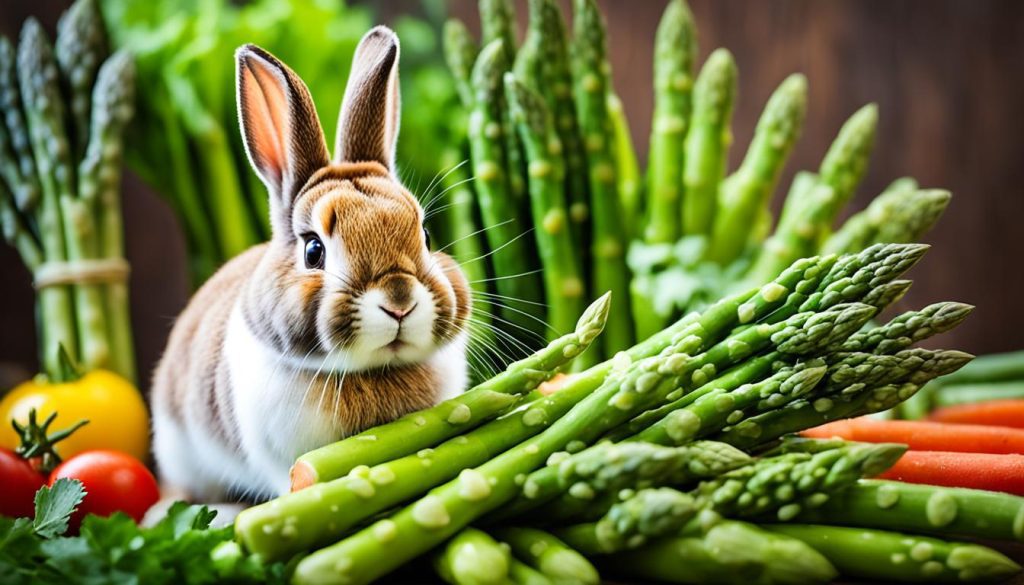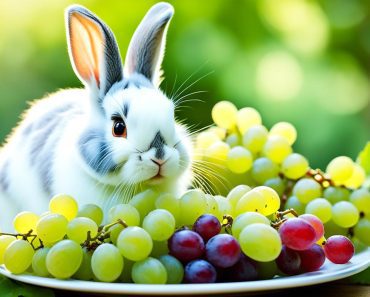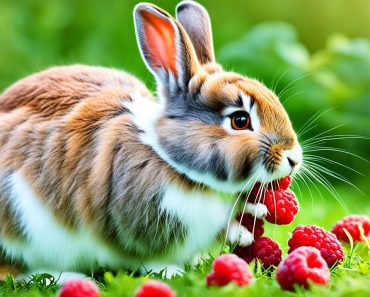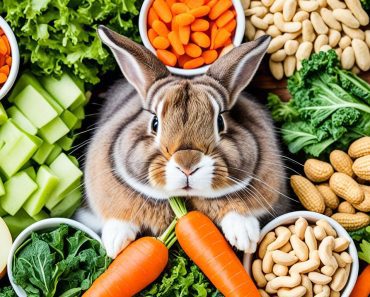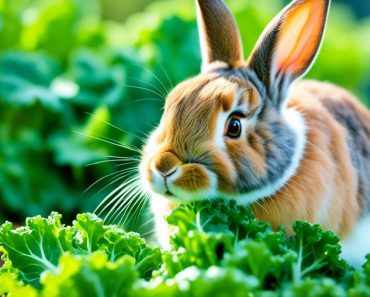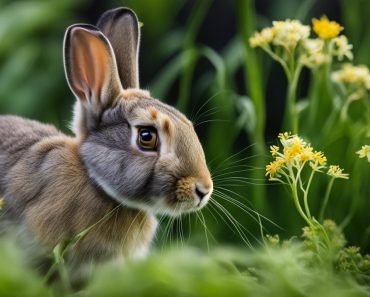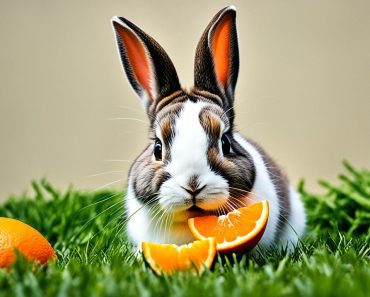Are you wondering whether rabbits can eat asparagus? If so, you’re in the right place! As a rabbit enthusiast, I understand the importance of feeding our furry friends a healthy and balanced diet. In this article, I’ll provide you with valuable insights on the topic and share some useful tips on incorporating asparagus into your rabbit’s diet.
Can Rabbits Eat Asparagus? Yes, they can occasionally eat it.
- Asparagus can be safely consumed by rabbits in moderation and offers nutritional benefits.
- It’s rich in vitamins A, C, and K, as well as folate and potassium.
- Asparagus is low in calories, high in fiber, and aids in digestion.
- Remember to introduce asparagus gradually and in small quantities to avoid digestive upset.
- Consult with a veterinarian before making significant changes to your rabbit’s diet.
Benefits of Asparagus for Rabbits
Asparagus offers several benefits for rabbits. It is a good source of essential nutrients and fiber, making it an excellent addition to their diet. The vitamins and minerals found in asparagus contribute to the overall health and well-being of rabbits.
Asparagus is particularly beneficial for digestion and can help prevent gastrointestinal issues in rabbits. The high water content of asparagus also helps to keep rabbits hydrated, which is especially important during hot weather.
Feeding Asparagus to Rabbits
When it comes to incorporating asparagus into your rabbit’s diet, it’s essential to do so with caution and care. Introducing this tasty vegetable gradually and in small quantities is key to ensuring your furry friend’s digestive health. Providing too much asparagus at once can lead to unpleasant issues such as gas and diarrhea, which can cause discomfort for your rabbit.
Before offering asparagus to your rabbit, it’s important to wash it thoroughly and remove any tough or woody parts. This ensures that your rabbit is consuming the freshest and safest portions of the vegetable. By taking this extra step, you can prevent any potential choking hazards or irritants.
While asparagus can be a nutritious addition to your rabbit’s diet, it should not be the sole vegetable they consume. It’s crucial to provide a variety of other vegetables to maintain a balanced and diverse diet. Mixing different vegetables together can provide a range of nutrients that contribute to your rabbit’s overall well-being.
Remember, it’s always a good idea to consult with a veterinarian before making any significant changes to your rabbit’s diet. They can provide personalized advice and guidance tailored to your rabbit’s specific nutritional needs. Your veterinarian will take into consideration factors such as your rabbit’s age, weight, and overall health to ensure they receive the best diet possible.
By following these tips for feeding asparagus to your rabbit, you can prioritize their health, happiness, and well-being. Remember to introduce it gradually and in moderation, along with a variety of other rabbit-safe vegetables to create a well-rounded diet that supports optimal nutrition.
Is Asparagus Healthy for Rabbits?
Asparagus is a healthy vegetable for rabbits to consume. It is low in sodium, calories, and fat, making it an ideal choice for their diet. Asparagus contains essential minerals and vitamins such as vitamins B6, C, E, and K, as well as zinc, magnesium, and folic acid. These nutrients are important for supporting rabbits’ overall health and well-being. Additionally, asparagus provides a good amount of protein and fiber, which aids in digestion.
However, while asparagus is a nutritious option for rabbits, it is important to note that their primary source of fiber should come from hay and grasses. This is because the fiber content in asparagus is not as high as in hay, which is essential for maintaining a healthy digestive system in rabbits.
“Asparagus is an excellent addition to a rabbit’s diet as it offers essential nutrients and fiber. However, it should be given in moderation, and hay should remain the primary source of fiber in their diet.”
When including asparagus in a rabbit’s diet, it is recommended to introduce it gradually and monitor their response. Start with small quantities to assess their tolerance and digestion. If any digestive issues, such as gas or diarrhea, occur, it is advisable to reduce or eliminate asparagus from their diet.
Remember to wash the asparagus thoroughly before feeding it to your rabbit and remove any tough or woody parts to prevent choking hazards.
By offering a variety of vegetables, including asparagus, alongside hay and fresh water, you can provide a well-balanced and nutritious diet to your rabbits.
Do Rabbits Like Asparagus? How Should You Prepare It?
Rabbits enjoy the taste of asparagus as it contains the fiber they need to survive. It is essential to give rabbits raw asparagus and not cooked or processed. Removing any cooked or processed foods from their diet is important, as rabbits do not encounter them in the wild.
The entire stalk of the asparagus can be given to rabbits, including the bottom end that is typically removed. Rabbits have strong teeth and can easily chew through the fibrous parts of the asparagus. This provides them with additional enrichment and helps keep their teeth healthy.
When introducing asparagus or any new vegetable to your rabbit’s diet, it is recommended to do so gradually. Start with small quantities and monitor their digestion. This allows you to identify any potential sensitivities or allergies.
How to Prepare Asparagus for Rabbits:
- Wash the asparagus thoroughly to remove any dirt or pesticides.
- Trim off any tough or woody parts of the asparagus.
- Cut the asparagus into small, bite-sized pieces.
- Mix the asparagus with other rabbit-safe vegetables to provide a balanced and varied diet.
Remember, every rabbit is unique, and their preferences may vary. Some rabbits may take to asparagus right away, while others may be a bit more hesitant. The key is to be patient and persistent in introducing new foods to ensure your rabbit receives a diverse and nutritious diet.
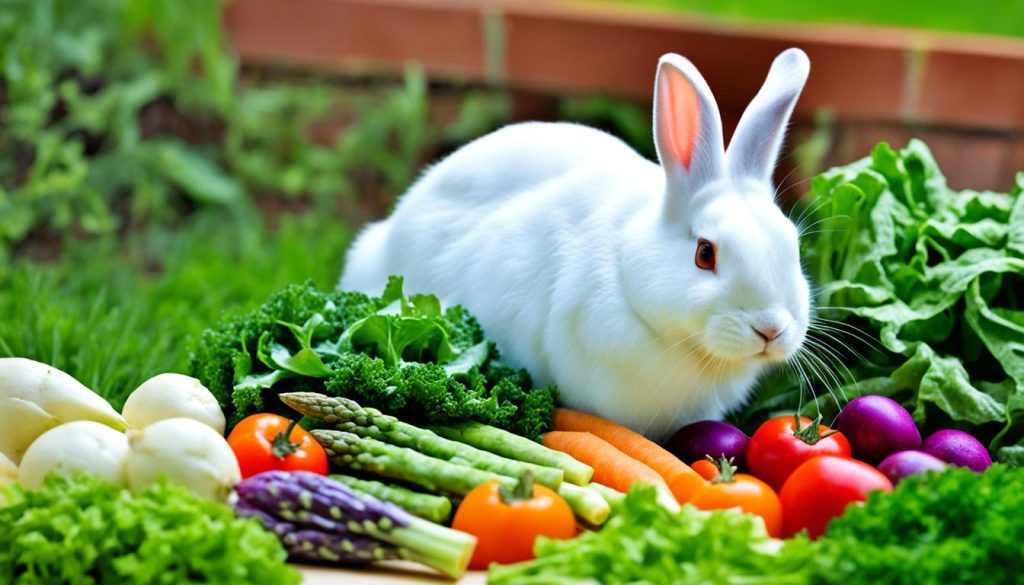
Next, let’s explore the ideal rabbit diet and the essential components that contribute to their overall health and well-being.
The Ideal Rabbit Diet
When it comes to the diet of rabbits, balance is key. Providing them with a nutritious and well-rounded diet is essential for their overall health and well-being. As a responsible rabbit owner, it’s important to understand the components of an ideal rabbit diet.
First and foremost, rabbits should have access to fresh, clean water at all times. Hydration is crucial for their overall health and helps maintain proper bodily functions.
Another vital component of a rabbit’s diet is hay. Hay provides the necessary fiber that rabbits need for healthy digestion. It helps prevent gastrointestinal issues and keeps their teeth in good condition. A variety of hay options are available, such as timothy, orchard grass, and alfalfa. Choose the type that is suitable for your rabbit’s age and specific needs.
In addition to hay, fresh vegetables should also be included in a rabbit’s daily diet. Vegetables should be chopped up into small pieces or given in small quantities to prevent overfeeding. Raw vegetables, including asparagus, are safe and nutritious options for rabbits. They provide vitamins and minerals that contribute to overall health.
Pellets made from natural ingredients are another beneficial component of a rabbit’s diet. Look for pellets that are high in fiber and free from harmful additives. Feed them in moderation, as pellets should not make up the majority of a rabbit’s diet. They should serve as a supplement to hay and vegetables.
It’s important to note that each rabbit is unique, and their dietary needs may vary. Consulting with a veterinarian who specializes in exotic animals is recommended to ensure your rabbit’s diet aligns with their specific requirements. They can provide tailored advice based on your rabbit’s age, weight, activity level, and health condition.
Conclusion
Rabbits can safely eat asparagus as part of a balanced diet. Asparagus provides essential nutrients, including fiber, vitamins, and minerals, contributing to the overall health and well-being of rabbits. It is important to introduce asparagus gradually and in moderation to avoid any digestive issues. Consulting with a veterinarian is recommended before making significant changes to a rabbit’s diet. By following these guidelines, you can ensure the health and well-being of your furry friend.
